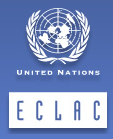In its assessment of the impact of Tropical Depression 12-E on Central America, the UN Economic Commission for Latin America and the Caribbean (ECLAC) explores possible policy responses in areas such as food security, watershed management, flood protection control, early warning systems, land use planning, threat mapping, building codes, payment for environmental services and risk pooling.
 4 May 2012: The subregional headquarters for Mexico and Central America of the UN Economic Commission for Latin America and the Caribbean (ECLAC) has issued an assessment of the impact of Tropical Depression 12-E on Central America. The assessment includes, at the behest of Central American Heads of State, some reflections on the regional policy implications of tropical storms that appear to be increasing in frequency and severity due to climate change.
4 May 2012: The subregional headquarters for Mexico and Central America of the UN Economic Commission for Latin America and the Caribbean (ECLAC) has issued an assessment of the impact of Tropical Depression 12-E on Central America. The assessment includes, at the behest of Central American Heads of State, some reflections on the regional policy implications of tropical storms that appear to be increasing in frequency and severity due to climate change.
In its assessment of the socioeconomic impacts of Tropical Depression 12-E on Costa Rica, El Salvador, Guatemala, Honduras and Nicaragua, ECLAC suggests that part of the reason the storm caused nearly as much impact as a full-fledged hurricanes is that, in recent years, the region has been hit frequently by natural disasters and it has not had sufficient time to recover and reconstruct from one disaster before another occurs. To reduce their vulnerability to natural disasters, build resilience and attempt to break the cycle of ongoing reconstruction, the report recommends that each of the Central American countries particularly focus on improving food security, including by introducing drought- and flood-resistant crops and improving food preservation and storage systems, and preventing erosion by improving watershed management, flood protection structures, land rehabilitation and reforestation.
The report also discusses several areas that might benefit from regional cooperation, dialogue and consensus to proactively address shared risk factors, linkages and dependencies. These include developing: a regional early warning system; joint studies on rationalizing human settlement spaces to avoid areas often threatened by natural disasters; agreed criteria on land use planning for disaster risk reduction (DRR); and Mesoamerican maps of threats, vulnerabilities and risks to natural disasters.
The report recommends exploring regional cooperation in related policy areas that can reduce risks and build resilience, such as building codes and standards for water and sanitation systems, flood control and slope and runoff management.
In terms of financial and budgetary resources and instruments, the report suggests considering, inter alia: a regional insurance risk pooling facility; a regional agreement on the creation of markets for environmental services, which might help manage watersheds and fight erosion while providing new financial resources; and development of new financing mechanisms for reconstruction and recovery, as well as for climate risk reduction and adaptation. [Publication: Regional Summary of the Impact of Tropical Depression 12-E in Central America: Quantification of Damages and Losses Suffered by the Countries of the Region in October 2011 (Some reflections on the new “normal” of disasters) (in Spanish)]